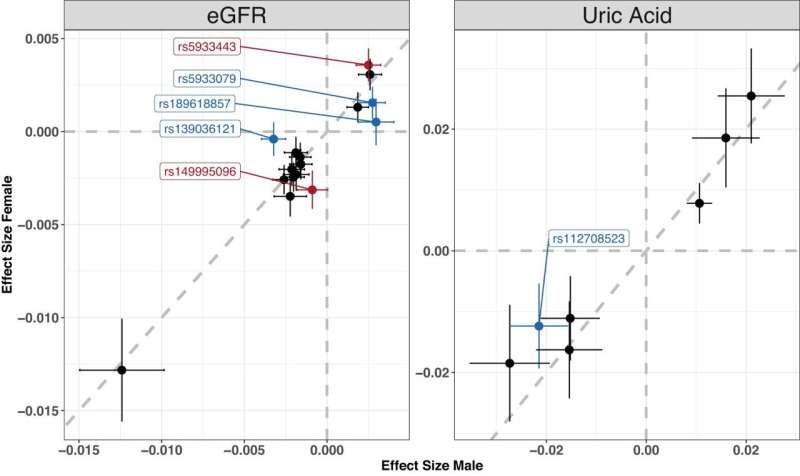This article has been reviewed according to Science X's editorial process and policies. Editors have highlighted the following attributes while ensuring the content's credibility:
fact-checked
trusted source
proofread
New sex-specific genetic variants for chronic kidney disease identified

Working with an international consortium, scientists at Leipzig University have identified new genes that may play a role in chronic kidney disease. They analyzed data from more than 900,000 people and found effects that in some cases differed between men and women.
These new findings may help scientists better understand sex-specific differences in the risk and progression of chronic kidney disease, and provide a starting point for appropriate treatments. The findings have recently been published in Nature Communications.
Approximately 10% of the world's population currently suffers from chronic kidney disease (CKD). This puts people at increased risk of kidney failure, cardiovascular disease and hospitalization—and places a heavy burden on the health care system. Due to the demographic changes of an aging population, it is predicted that CKD could become one of the five leading causes of death worldwide by 2040.
In a large-scale study, scientists from Leipzig University, in collaboration with other international study groups, investigated genetic associations between variants of the X chromosome and seven selected parameters of kidney function in men and women. The study was based on blood samples and genetic information from a total of more than 900,000 people, 80% of whom were of European descent.
"We identified a total of 23 associations: 16 relate to the estimated glomerular filtration rate of the kidney and seven to uric acid," explains study leader Professor Markus Scholz from the Institute for Medical Informatics, Statistics and Epidemiology (IMISE) at Leipzig University. Along with uric acid, glomerular filtration rate is a key measure of kidney health. It shows how much blood the glomeruli—small vessels in the kidney tissue—can filter per unit of time.
The researchers found different effects in men and women at six positions in the genome. The scientists were able to assign functionally plausible candidate genes to the newly discovered genetic effects.
"The sex-specific differences could be explained by hormonal regulation of the associated genes," reports study analyst Katrin Horn from IMISE.
"This finding helps us to better understand possible mechanisms of disease development and progression," says Professor Markus Scholz. "For example, we already know that the disease is more common in women, but progresses faster in men. We now have suitable mechanisms to investigate these phenomena further."
In their analysis of X-chromosomal variants, the Leipzig scientists looked at mutations at around 270,000 positions on the chromosome and correlated these with the clinical kidney parameters. They also used tissue data to check whether and how the genetic information was actually used. A targeted search for differences between the sexes was carried out.
"We deliberately chose to analyze the more complicated X chromosome, which has not yet been sufficiently investigated in terms of genetic associations despite being very promising with regard to sex-specific differences in diseases," says bioinformatics researcher Professor Scholz. "The reason for this is that women have two of these chromosomes, but the genetic information is only partially utilized and it is not exactly understood in what way and to what extent this happens."
The method that Professor Scholz and his team have developed for this study to analyze the X chromosome in detail and identify sex-specific differences can also be used by other research teams in the future to contribute to sex-sensitive medicine for other diseases.
The study was part of the international CKDGen consortium for research into the genetics of kidney disease, which is led by Professor Anna Köttgen of the University of Freiburg, with Leipzig University as a key partner. It included data from the Leipzig studies LIFE Heart, LIFE Adult, LIFE Child and the Sorb Study, from a total of approximately 14,000 data records. The bulk of the analysis and interpretation of the data was carried out by Professor Scholz's research group.
More information: Markus Scholz et al, X-chromosome and kidney function: evidence from a multi-trait genetic analysis of 908,697 individuals reveals sex-specific and sex-differential findings in genes regulated by androgen response elements, Nature Communications (2024). DOI: 10.1038/s41467-024-44709-1



















